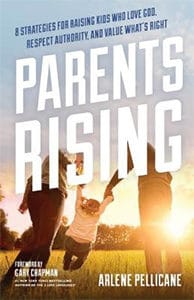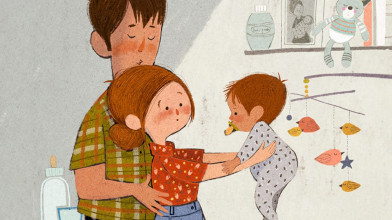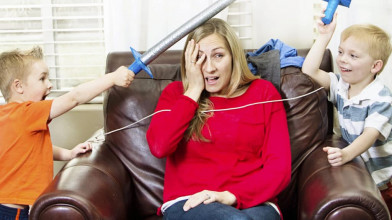Preview:
Arlene Pellicane: If you’re going to have the rules you also have to have fun time, that you need that relationship with your child, that you have to ask yourself, “Are there times that I’m actually having fun with my child, like, do we laugh together, do we smile together?” Do … You know, if I was my child and I had to look at my face (laughs) all day long, you know, would I be afraid or would I be okay with this? And for a parent you need to ask this question ’cause it’s true, you do need the rules, but you must have the relationship or those rules don’t mean a thing.
End of Preview
John Fuller: Our guest today on Focus on the Family is Arlene Pellicane and your host is Focus president and author, Jim Daly, thanks for joining us, I’m John Fuller.
Jim Daly: John, we all want to, uh, do the very best for our children, best schools, the best sports program, you want the honor student, uh, bumper sticker and all those good things. We’re tryin’ hard to help our kids, not so much to have the advantage, but to give them every opportunity to do well in this life and I think that’s admirable. Uh, but God called us as parents to train up the next generation in a spiritual context, to stand for what’s right, um, to instill character and provide discipline that goes along with that, uh, parenting journey, and most of all it’s to teach our children about him so that they can live a long and good life before the Lord. Here at Focus on the Family we- we want to help you do that, that’s our main goal is to give you those tools to do that job as best as you can. And that’s one of the reasons we’ve invited back, uh, Arlene Pellicane, she joins us today as we talk about, uh, Parents Rising: 8 Strategies for Raising Kids Who Love God, Respect Authority, and Value What’s Right. I can’t wait to get into this.
John: And Arlene is such a popular guest, we always have a tremendous response when she’s here and w- we just personally enjoy interviewing her. Uh, she and her husband, James, have three children. We’ve had them here in the studio-
Jim: (laughs)
Arlene: (laughs)
Jim: Takin’ pictures.
John: … and-
Arlene: They like it here.
John: … they are good kids too, and the family lives in San Diego, California.
Jim: Arlene, welcome back to Focus on the Family.
Arlene: So good to be with you, thanks for having me.
Jim: Arlene, uh, you share a great story about a young girl, um, at your children’s elementary school-
Arlene: Mm-hmm.
Jim: … I think it was. Um, what did she say that made you realize there’s a problem with-
Arlene: Yeah.
Jim: … the way kids are, uh, treating adults these days. (laughs)
Arlene: I was volunteering and we were going to play a relay race, which sounds fun enough, and the-
Jim: Sure.
Arlene: … kids were supposed to get in line. And I saw a volunteer say, “Please get in line,” and a little third grader say, “Make me,” and-
Jim: Oh yeah.
Arlene: … I thought, “Make me?” Can you imagine if your grandmother was at school and said, “Make me.” You know, there is no such thing, that did not happen in previous generations.
Jim: Them are fightin’ words.
Arlene: Them are fightin’ words.
Jim: (laughs)
Arlene: So that really made me think, what has made this kind of attitude, this boldness in children, that they feel okay saying those kinds of things. You know, I have been in church, and I have volunteered, and I have shushed a child just to have a child look at me, like, “Who are you to tell me to be quiet.
Jim: Really?
Arlene: You know, you’re the one talking while the other (laughs) person’s talking at the microphone.” And so I have experienced this and I’m sure many of our listeners have seen this bold change. Maybe you’re in education and you see it your classroom. You’re a mom or dad, you see it in your home (laughs) and so-
Jim: (laughs)
Arlene: … that’s what really made me think, I want to address this in Parents Rising, that as parents we’ve got to rise up to show that, hey, this is not right, you need to respect authority and that’s something worth teaching our children.
Jim: Well that’s a great point, uh, l- let’s get to the basics. So why do kids have that sense of entitlement? What-
John: Mm-hmm.
Jim: … is making that happen? Are we doin’ it as parents?
Arlene: We are, kind of, guilty of this. So we can say, “Oh it’s the culture around them, it’s social media, it’s the music, that popular-
Jim: Everything out there.
Arlene: … music, everything out there is destroying my child.” And, yes, we live in an unGodly culture, but, you know, you look at these people like Daniel in the Babylonian culture, I’m sure that was a lot harder to live back then then it is now. So, my heart is, let’s not blame the culture for what has happened to children, let’s look at our families and can my children respect me and let’s start there. And so I think for parents, it is this idea that maybe in generations past the parent was really big and the child was really teeny.
Jim: Yeah.
Arlene: So now we’ve made the child super big and the parent really teeny-
Jim: Oh that’s-
John: Mm-hmm.
Jim: … fascinating-
Arlene: … and we’ve-
Jim: … yeah.
Arlene: … got to swing that pendulum back to that balance of, “Of course, child, you are to be heard, and loved, respected, cherished, but I am the parent and I’m the leader here, and not the other way around.”
Jim: Yeah, I could see this, uh, nationally released motion picture, Parents Rising–
Arlene: That’s right. (laughs)
Jim: … (laughs) and that’s big.
John: (laughs)
Arlene: It’s like-
Jim: You know, some good …
Arlene: … a call to arms, “Let’s go parents.”
Jim: Yeah-
John: (laughs)
Jim: … it’s a great-
Arlene: That’s like …
Jim: … Ben-Hur voice. (laughs)
Arlene: And it’s, like, you know, “Now we will use our ultimate weapon, no.”
Jim: (laughs)
Arlene: It’s, like, parents who can actually say no.
John: In a world.
Jim: That’s it.
Arlene: Yes, uh-huh-
Jim: (laughs)
Arlene: … in a world of yes-
Jim: We’ve got the voiceover right here.
Arlene: … we say no.
John: (laughs)
Jim: But, um, in the book you talk about eight key strategies. We’re not gonna be able to cover ’em all, certainly y’all can get a copy of the book here at Focus on the Family. Help us to do great ministry along with s-, uh, getting a tool to help you do better parenting. But let’s take, uh, a look at some of them, let’s-
Arlene: Mm-hmm.
Jim: … uh, go ahead and give us the eight and then I’m gonna come back-
Arlene: Okay.
Jim: … and pick two or three.
Arlene: Sounds great. The first strategy is amusement is not the highest priority. Your life does not have to revolve around entertaining your child with a cell phone.
Jim: I’m guilty. (laughs) Uh, that’s a tough one.
Arlene: Number two is parents call the shots. You are the leader, not your child. Number three is routine and boundaries provide security. Number four is the Bible and prayer are present daily, so not just on Sundays and then we live like every other family on the block, but you see this woven into the fabric of our lives. You see the Bible, you hear us pray. Number five is marriage takes a front seat, that, you know, when kids come into the picture, the marriage can go in the trunk for 18 years and so bring that marriage back as a priority relationship.
John: Hm.
Jim: Some people are saying, “Ouch,”-
Arlene: Yeah. (laughs)
Jim: … when they hear that, ’cause it’s so true-
Arlene: Right.
John: Yeah.
Jim: … and it’s easy to fall into that one. We’ll come back to that.
Arlene: Yeah. And number six is good food served on the table, so the food of conversation around a table, and then nutritional food, so we’re not living on chips and soda and, uh-
Jim: (laughs) That’s good.
Arlene: … number seven, is love is spelled T-I-M-E, and it’s that good ol’ time that you-
Jim: Mm-hmm.
Arlene: … need to spend with your kids. And then number eight is launching adults, not babying children, that it’s not our job to keep them for life, it’s our job to send ’em off for life.
John: Mm-hmm.
Jim: When you said that at first I was thinking, you know, the kids are launching-
Arlene: (laughs)
Jim: … the parents-
Arlene: Yeah. (laughs)
Jim: … launching adults. (laughs)
John: (laughs)
Arlene: Launching them to-
Jim: Yes.
Arlene: … who knows where.
Jim: (laughs) Good job kids, way to launch your parents. (laughs)
John: (laughs)
Arlene: (laughs)
Jim: You mean it the other way.
Arlene: Uh, the other way around.
Jim: That’s funny.
John: Yeah.
Jim: Well let’s look at number two, uh, parents call the shots. I’m just picking some here.
Arlene: Yeah.
Jim: Again, if I’m not touching on the ones you’re interested in, get Arlene’s book or come to the website, we’ll post the eight there and you can-
Arlene: Mm-mm.
Jim: … take a look at the definitions. But parents calling the shots. That can sound autocratic. Um, describe for us what you mean by that, give us a couple of illustrations of how that works.
Arlene: This is so simple. If we can just simply get Ephesians 6, “Children obey your parents,” and we just get that. And it’s what the word of God says, it is the fifth commandment, “Honor your father and mother, so that it will go well with you in the land that you’re living.” And so this is how God has set it up, so even if we are more comfortable being on an equal plane, being a best friend, being, you know, your supporter and your buddy, if that … You know, but the Bible is telling us you are the authority figure and that authority figure doesn’t have to be this mean, strict, you know, awful, no, this is an authority figure that is loving, that’s providing guidance.
‘Cause I think many of us, as parents, we want to be chummy- chummy instead of saying, “I’m not afraid to be unpopular to make decisions that I know are good for you.”
Jim: Yeah.
Arlene: You know, so that whole idea of honor and bringing that back.
Jim: Yeah. Um, you mention in your book about honor, as we’re talking, and the importance of kids honoring their parents, which is definitely-
Arlene: Mm-hmm.
Jim: … a biblical concept. This may be one of the more difficult attributes and you’ve touched on it-
Arlene: Mm-hmm.
Jim: … but how can we teach that on a regular basis-
Arlene: Yeah.
Jim: … that doesn’t, maybe, involved, uh, demotion.
Arlene: You know, Dannah Gresh took a look at my book, Parents Rising, and she wrote this endorsement, and in it she said, “The kingdom of God is not a democracy and so we have to learn how to bow to a king.” And in the same way, I’m not saying your kids have to bow to or worship you, no, but your kids have to learn there is an order to life, there is, there are people above you to be honored and that begins with parents. Those are teachers, those are police officers, those are people in public office, you know, people that you honor, that you respect. And so it starts at home and if your-
John: Hm.
Arlene: … kid, whether they’re two, or they’re 12, or they’re 18, they cannot give you honor as parent, respecting you, saying … You know, we always tell our children, “You don’t have to agree with us, but you must respect us, you know, you can’t call us names.” And so we talk through that, because that’s not honoring, that’s not respectful. So it’s something you can teach your children and then really insist upon it that you have to talk to me this way. And whether it’s a husband saying, “You can’t talk to my wife that way,” you know to the kids or vice versa. So stick up for each other as a married couple and make sure your children are talking to you in the right way.
John: Hm.
Jim: Boy that’s good, it’s good stuff. Here’s the question of the day-
John: Okay-
Jim: … you ready John?
John: … I’m dialed in.
Jim: This is it, the question of the day, how can we encourage obedience?
Arlene: That’s right. It’s, like, I want them to honor me, how do I get them to honor me, right?
Jim: Yeah, (laughs) right.
Arlene: How do I-
John: Uh, yeah.
Arlene: … actually-
Jim: Yeah.
Arlene: … get them to believe I have seniority in this-
Jim: This is the deal.
John: (laughs)
Arlene: … in this relationship-
Jim: The obedient part-
Arlene: … yeah.
Jim: … right.
Arlene: So in the book I outline four ways to help your kids obey and I will say the overarching principle here is the belief that you are worthy of obeying. You know, if you’re second guessing yourself, “Well, maybe they shouldn’t obey me, I’m not a really good parent, maybe I don’t know what I’m doing.” So it has to begin with you realizing I am to be honored, I am to be obeyed because I’m a parent. And of course, as a parent, you’re trying to strive for them to obey you on good things, on good healthy things for them. So, first of all you can set up clear expectations.
Jim: Mm-hmm.
Arlene: Sometimes they don’t know to obey because they simply don’t even know what they’re doing. So before you go to grandma’s house you say, “These are the things we expect. We expect that you’re not gonna run through the house, ’cause grandma and grandpa don’t like that. We expect that you will not fight, because grandma’s 80 and that will really bother her, (laughs) so don’t fight-
Jim: Um, this is good.
Arlene: … with each other-
Jim: This sounds like real life-
Arlene: … do that, do that in the car beforehand.” You know, I’ve had my kids, like, be really loud in the car and, “What are you doing”? “We’re getting ready for grandma’s house.” (laughs)
Jim: (laughs)
Arlene: I’m like, “Okay.”
John: (laughs)
Arlene: So you’re setting up your kids to succeed. In a new situation, “We’re going to a new Sunday School class, there will be strangers there, you won’t know anyone, and I just want you look for one person, smile at them, and befriend them.” You’re giving them-
Jim: That’s good, assist teaching them.
Arlene: … expectations-
Jim: Yeah.
Arlene: … and have them obey that. The second thing is practice- practice- practice. So, let’s say you’re having trouble in the grocery store because they’re loud or they, you know, want, they’re real whiny about what they want, et cetera. You go to the grocery store just for practice, not to get the stuff on your list, but just to practice, “This is how we go to the grocery store,” and when they throw their fit, “Oh, we’re leaving.” And you know-
Jim: And you just go.
Arlene: … and there’s a punishment there and maybe-
Jim: Yeah.
Arlene: … if they did it well it would be, “Hey you get to pick something out, ’cause you did really well in the grocery store,”-
Jim: Yeah.
Arlene: … so you’re practicing. The third thing is drama, so some of your kids love drama and so it-
Jim: That is- (laughs)
Arlene: … the idea of, you know, “Okay, it’s the first day of school, let’s act this out. This is how I’m the teacher, this is how you …” and use drama to act out, “This is how you-
Jim: Oh, that kind of drama.
Arlene: … act,” yeah. Yeah-
Jim: I thought you were saying-
Arlene: … not the-
John: (laughs)
Jim: … kids are just drama.
Arlene: … not the other drama.
John: Yeah.
Jim: (laughs)
Arlene: So physically use drama.
John: Yeah.
Arlene: “I’m your teacher, you’re in a new school setting, here’s what we do, here’s what we expect of you to obey.” And then the last may be the most powerful, and it’s praying specifically, “God, give my child an obedient heart and-
Jim: Yeah.
Arlene: … give my child a moldable-
Jim: That’s good.
Arlene: … heart, a heart that seeks wisdom, a heart that seeks knowledge, God, give them that,” and those are ways you can help your child be obedient to you.
John: Hm.
Jim: Arlene, I want to make sure that we balance this with, I’m thinking of a, or we can just pick a stereotypical situation, maybe the overbearing father, to leave it in that, kind of, category, certainly moms can be that way as well. How do we recognize in ourselves that we’re- we’re not loving our children-
Arlene: Hm.
Jim: … we’re only about the rules, we’re only confrontational, we’re only demanding. Um, sometimes we can feel a little bit of guilt in that area, especially if you’re in the heat of battle there, trying to get your kids (laughs) to be obedient, and then you feel guilty, like, I was over the top. Um, how- how do you know when you are too consistently over the top?
Arlene: And for that parent who’s listening, that, the book title may be better, Parents Smiling, (laughs) like-
Jim: Yeah.
Arlene: … you need to be more relaxed. You know most-
Jim: Not rising, but-
Arlene: … most-
Jim: (laughs)
Arlene: … parents, many parents, they err towards being too gracious to their kids, but for the parents that you know, like, “Wow, I’m for, maybe too strict.” And that comes, that strategy that love is spelled time, that if you’re going to have the rules, you also have to have fun time, that you need that relationship-
Jim: Hm.
Arlene: … with your child, that you have to ask yourself, are there times that I’m actually having fun with my child? Like, do we laugh together-
Jim: Mm-hmm.
Arlene: … do we smile together, do … You know if I was my child and I had to look at my face (laughs) all day long, you know, would I be afraid or would I be okay with this? And for a parent you need to ask this question, ’cause it’s true, you do need the rules, but you must have the relationship or those rules don’t mean a thing.
John: Mm-hmm, right.
Arlene: So you need both and there has to be time for fun and levity, because that paves the way for the rules.
Jim: I don’t think anybody has coined a better phrase than Josh McDowell with that-
Arlene: Yes.
Jim: … “That rules without relationship lead to rebellion.”
Arlene: Absolutely.
Jim: And that’s a great formula-
John: Hm.
Jim: … for parents to remember.
John: Well some super, uh, insight and encouragement from Arlene Pellicane today on Focus on the Family and, uh, Parents Rising is the title of her book.
Jim: See it in a movie theater near you.
Arlene: That’s right- (laughs)
John: (laughs)
Jim: (laughs)
Arlene: … I love that.
John: Or if you’re like the parent she was just describing, parents smiling-
Arlene: Smiling.
John: … is the subtitle.
Jim: I like that too.
John: Uh, look for Arlene’s book, and a CD, or a download of this broadcast at focusonthefamily.com/broadcast.
Jim: And, Arlene, uh, kind of following that train of thought we were just talking about, strategy number three is how to get them, your kids introduced to rules and boundaries in the family. What … How we gonna do that, how do we start talking to the kids about rules and this is the expectation?
Arlene: My husband, when he was young, he had this little poodle named Fluffy and he remembers that Fluffy would only-
Jim: Is he still in counseling?
Arlene: (laughs)
John: (laughs) That’s the kind of dog that bit me.
Arlene: The next dog would be Rocky, you know.
Jim: (laughs) Your husband’s dog was named Fluffy-
Arlene: (laughs)
Jim: … wait a minute.
John: (laughs)
Arlene: Sounds like a bunny rabbit, right?
Jim: It does-
Arlene: (laughs)
Jim: … but that’s okay, it’s therapy.
Arlene: So, sweet Fluffy knew where she could go in the house, that the linoleum was her territory and the other parts weren’t. And James had this thought, like, “If a dog can be trained where to go, surely my baby and, you know, as they grow up, can know where to go too.” So we put the blue painting tape across the line of the kitchen when our baby started crawling and when baby Ethan would come to the tape we would stop and we would do in sign language, no, and we’d look very harsh, and very mean, and we’d say no. And he got that really fast, like, this blue line means no, so he would trot right up to the blue line, crawling baby, and stop. Now when our kids … We’re like a circus show.
Jim: (laughs)
Arlene: When our friends came over and we show them the blue line, they’d say, “No way, no way,” and then the baby really stopped there, like, that’s ridiculous. And then they said, “Wait ’til your child starts walking. That blue line will not stop your walking child.” But James has that stubbornness that Parents Rising stubbornness of, like, “Oh no, my child will, can do that.”
Jim: (laughs)
Arlene: And so when Ethan got bigger, he’d stop right on a dime. He’d walk right up to that blue line and he knew the kitchen was out of bounds for him. And when he turned about three or four, we took off the blue tape and we said, “You are now free to enter the kitchen,” and he did it, and why could he do that? Because we had this expectation that this is your boundary, we enforced it, you know, when he was a baby. So when he was a baby he learned, “I’m not supposed to do this,” and it just carried over, it just stuck with him. And so with your kids, just know they’re really never too young or too old to learn the new boundaries you’d put into place. Maybe the new boundary is, “Hey, your cell phone is being charged in my room overnight (laughs) instead of your room overnight,” to your teenager and that’s a new boundary and you can enforce that. And to young kids, you can teach ’em more than you think. Think of this little baby and (laughs) the blue line. Your kids can do more than you think, and you can enforce boundaries early, and it makes your life easier as they grow up.
Jim: All right, strategy seven, love is spelled time. You’ve mentioned it three or four times, be specific. People talk quantity, quality, uh, you’re counseling me as a parent, what should I be aware of?
Arlene: So you know how kids do all these activities, right? You’re in sports, you’re in ballet, you go to all these things, and so parents … But our time is, like, chauffer time a lot or just-
Jim: (laughs)
Arlene: … sitting on the sideline-
Jim: It is.
Arlene: … time. So we Pellicanes are a little strange, so we thought, if we’re gonna spend time doing an activity, let’s do it all together. (laughs) And so-
Jim: Oh my.
Arlene: … it began because, um, our daughter, Noel, when she was in elementary school, my husband saw a boy, like, pull her arm. And when he saw that he was, like, “My girl needs to learn martial arts,”- (laughs)
Jim: Oh no. (laughs)
Arlene: … like somethin’, like, clicked-
Jim: Good.
Arlene: … in his mind.
Jim: Yeah.
Arlene: And so before I knew it, we were all in martial arts together, all wearing matching dragon T-shirts-
Jim: (laughs)
Arlene: … parents included, and we as parents joined the kids’ class, which they allowed us to do, so it was, like, 20 kids and James and I in the back row. And we, my friends, have done this for five years and it is because we believe in love is spelled T-I-M-E. So, find an activity that you like together. So many families, we watch each other do stuff, but we don’t do anything together. And believe me, this is a stretch, I am so nonathletic. You know, I took bowling for c-, my college sport, you know-
Jim: (laughs)
Arlene: … so it’s, like, I am not-
John: No diss on people that bowl.
Arlene: … I am not- not-
Jim: That’s an ath-
Arlene: Exactly.
John: … we’re good.
Jim: … athletic event right there.
Arlene: You know, obviously I am not this amazing athlete. And so we have done biking, we have done rollerblading, skiing, whatever, all these things to be together as a family. It could be chess, it could be board games, it could be sitting at the library together, it could be learning how to cook together, but choose an activity where you can spend time, ’cause that’s really good for boys. Boys don’t want to just, like, sit-
Jim: No.
Arlene: … like, talk to you, like, let’s have-
Jim: (laughs)
Arlene: … coffee and talk.
John: Even your face-
Arlene: They don’t, they don’t-
John: … right- right there.
Jim: Yeah, it’s, like, what-
John: (laughs)
Jim: … it’s sour-
Arlene: What boy wants to do that?
John: Ew.
Arlene: But a boy will bike with you, a boy will fish with you.
Jim: Board games.
Arlene: A boy will do a board game with you.
Jim: We do a lot of board games.
Arlene: Yeah. So, pick things that your family can do together, so that you are actually spending time, ’cause that s-, communicates so much love to them.
John: Hm.
Jim: Here’s one I want to spend a little time with because I think launching your kids.
Arlene: Mm-hmm.
Jim: You know, I, uh- uh, I don’t like the formulaic, kind of, connotation of it, but you can do some things that will enhance-
Arlene: Hm.
Jim: … uh, the outcome. It doesn’t guarantee it, you can do-
Arlene: That’s right.
Jim: … the, uh, the everything right.
Arlene: Yup.
Jim: Mom and dad, I’m tellin’ ya, uh, you, don’t beat yourself up-
Arlene: Mm-hmm.
Jim: … if the child chooses a different-
Arlene: Yes.
Jim: … path and I get that. But your strategy eight, launching adults, not babying children-
Arlene: Mm-hmm.
Jim: … uh, talks about that. Um- um, we’ve all heard the term helicopter parent and we’ve got all kind, mower, l-, (laughs) be the lawn mower parent, what have ya. I don’t know what that one is, but, you know, it gets closer and closer, I guess. What are you driving at there and how do we launch effectively?
Arlene: Yeah, it’s the idea that don’t do for your kids what they can do for themselves. So, you don’t have to pack your lunch for your eighth grader, you don’t have to do laundry for your high schooler, you don’t have to do those things, they can do that themselves. You just talk about the lawnmower, the mower. So my husband, James, was teaching Ethan how to mow the lawn, you know, he’s upper elementary school, he’s teaching him how to mow the lawn. And so I s-, go around the corner and I see Ethan struggling with a big grass bag trying to put it in our yard waste and I just see him struggling- struggling. “Oh, Ethan, I’ll help you.” And I pull open the waste bucket, so he can do it, right? James comes around the corner, “What are you doing?” I said, “I’m helping Ethan.” “No- no- no- no- no, don’t help Ethan.” And I’m, like, “Why can’t I help Ethan?” Come to find out, James had just had this talk with him-
Jim: (laughs) Oh.
Arlene: … saying, “You can do this, you just have to prop open the lid and then you dump the grass in. You can do this, you got this, you can do this.” And then of course he finds that mom is hovering, fixing it, right, doing the lawn-
Jim: Oh yeah.
Arlene: … it was so funny. So a man will look at that and say, “My son is becoming a young man,” right, and then we moms can say, “Oh, look at the poor baby, he needs mommy.
Jim: He can’t do it.
Arlene: He needs mommy to lift up the trash can for him,” you know. And so the roles can be reversed, but oftentimes there is a person, usually the mom, that is, like, “Oh let me get this for you,” you know, “Let me help you.” And of course you want to help your children, but when we hover too much and we do too much. You know, I think kids have cell phones not just for the kids, but for the parents, ’cause we want to know-
Jim: Absolutely.
Arlene: … where is our child, what is happening, you know. We send our child, 13 years old, two miles on his bicycle, without a cell phone, to school every day and he does just fine. Why do we do that, ’cause we wanna teach him, like, self-reliance. You know, my husband would say, “I’d go on my bike everywhere when I was a kid. If I got a flat tire, I had to figure it out, I had to learn how to fix that, and that’s what our son will do.” You know, and that’s so foreign in this day and age, where mom and dad come in, and we swoop in, and we rescue everything. And moms and dads-
John: (laughs)
Arlene: … we have to calm down, we gotta let our kids, um, figure stuff out on their own.
Jim: All right, let’s, uh, move to ROBS. You’ve got an acronym, uh, ROBS, what is it and let’s touch on a couple of ’em.
Arlene: The idea here is just finding out what those values are that are important to your family. So as you launch those adults, what do you want your kids to remember-
John: Mm-hmm.
Arlene: … from your home? And so we took this from Coach Lou Holtz and, kind of, changed it.
Jim: That’s pretty good.
Arlene: Yeah, we figured that was a good source.
Jim: This is what he would teach his players.
Arlene: He would teach his players. So the R stands for right, do what’s right. The O stands for do unto others, do unto others as you would have them do to you. The B stands for do your best, you know, work with excellence, and the S is smile, like, go through life-
Jim: I (laughs) like that.
Arlene: … and smile at other people. So as you go through life, and we’re launching these adults, you can talk about it, you know. So if something happened at school, “Well did you do the right thing? Did you think of others? Did you do your best, did you try for excellence, and were you smiling, were you pleasant, kind?” So it just helps them guide, that this is, these are the values-
Jim: Hm.
Arlene: … that are important to us as a family. And so you can talk about that as a family. When your child leaves your nest, what are the things that, “Oh, that’s what a s-, that’s what a Daly would do, that’s what a Fuller-
Jim: Yeah.
Arlene: … would do.” You know, what are those things that you want your family to be known for?
Jim: Yeah. Um, the big question at the end here is, uh, w- w- why is failure so important and what does it teach us, and there are so many biblical references to this. I don’t think you can find a strong character in the Bible that didn’t go through failure, through a valley. Let’s just think of King David.
Arlene: Yeah.
Jim: Uh, but there’s so many others. Almost every person that God uses, he brings through a difficult time to teach them and train them and why should it be any different for our children?
Arlene: I think what we have to concentrate on here is resiliency. So after the failure happens, how do we respond? You know, I have one of my children and they are such an amazing child, but once they sign my name on a field trip thing, because they’d forgotten to do it, and it was due, so they just scribbled my name. But when the teacher asked my child-
Jim: Mm-hmm.
Arlene: … “Did you do this or did your mother do it,” she got really nervous and said, “My mother did it.” And the teacher knew that was not-
Jim: Yeah, by the handwriting-
Arlene: … was not right.
Jim: … right?
Arlene: And so that was a huge thing. And then restoring trust with that teacher who says, “I always trust you, but in this instance you were not honest.” But I tell you what, that failure episode taught my child a lot, taught my child that you can find forgiveness and reconciliation because-
Jim: Yeah.
Arlene: … they totally reconciled with their teacher, taught that I can bring my failure to my parent and my parent will not freak out, you know. I had my child write a very detailed letter of apology to that teacher, but that was what happened after that. And there was understanding, we didn’t speak of it again. I don’t think, (laughs) I don’t think the other siblings know about it until now- (laughs)
Jim: Right. (laughs)
Arlene: … after they-
Jim: We’re just gonna speak about it-
Arlene: … listen to this, yeah- (laughs)
Jim: … and tell Focus on the Family.
John: Arlene reveals all.
Arlene: … until I say it-
Jim: (laughs) Sorry.
Arlene: … you know. So, you know, have your children realize they’re not-
John: Hm.
Arlene: … gonna do everything perfectly and that’s okay. And if you don’t make the team, that’s all right-
Jim: Yeah.
Arlene: … becau-, you know, don’t go in there as a parent saying, “Why didn’t my kid make the team, my kid’s the best one out there, you better put my kid in there,” no.
Jim: Wow, there is so much of that.
Arlene: Let your-
Jim: Hm.
Arlene: … kid fail so that when they’re an adult and they don’t get chosen for the promotion they can handle that.
Jim: Yeah.
Arlene: When they ask the girl for the date and she says, “No,” they can handle that.
Jim: Yeah.
Arlene: It’s very important to teach your children failure so they can succeed later in life.
John: Hm.
Jim: And that’s good. And sometimes you do it well as a parent and sometimes you swing and you miss. And I remember Troy, he did that, he went out for a basketball team, there like 40 guys goin’ out for 12 spots. And first night he- he was feeling good-
Arlene: Yes.
Jim: … he came, he got back in the car-
Arlene: Okay.
Jim: … and he said, “I made it dad,”-
Arlene: Yes. (laughs)
Jim: … ’cause they cut, you know, 20 kids that night. And I knew the second night was gonna be a little more difficult, and he went, and I was anticipating he may not make it. He’s a … He jumps in the car and he’s a little quieter than the night before and I- I asked, you know, “How’d you do, did you make it,” and he said, “No, they- they cut me, but”, he said, “I was really glad I got this far.”
Arlene: Good for him.
Jim: So it was good, that’s a-
Arlene: See, that’s really good.
Jim: … good response.
Arlene: It’s absolutely.
Jim: And I said, “Well just, you know, you gotta learn in the off season-
Arlene: Mm-hmm.
Jim: … here. Shoot some hoops and then maybe try again next time,” so.
Arlene: And that’s a great phrase isn’t it? After failure, learn in the off season.
Jim: Right.
Arlene: So you didn’t get it, but there’s a lot to learn in the off season.
Jim: And it’s so true and, you know, you- you, we live in such a wonderful country that if you apply yourself-
Arlene: Mm-hmm.
Jim: … really apply yourself, you really can do almost anything and the Lord will open doors to you. Arlene, this has been terrific, it’s flown by, Parents Rising, that movie near you-
Arlene: (laughs)
John: (laughs) I like that.
Jim: … Parents Rising.
Arlene: (laughs)
Jim: But, uh, what a great book and what terrific, uh, material for parents to help that resiliency-
Arlene: Mm-hmm.
Jim: … uh, developing that resiliency in your children, um, that is so good. If you can make a- a gift to Focus on the Family, we’ll say thank you by sending it along to you. If you can’t afford it contact us anyway, we’ll have friends that, I hope, will underwrite the cost of that. But, Arlene, it’s been great havin’ you back.
Arlene: Thanks so much for having me.
John: Hm, and stop by our website to make a generous donation and get resources like Arlene’s book, Parents Rising, and a CD, or a download of this broadcast at focusonthefamily.com/broadcast, or call 1-800, the letter A, and the word FAMILY, and we’ll tell you more. Well on behalf of Jim Daly and the entire team here at Focus on the Family, thanks for listening. I’m John Fuller inviting you back next time as we once more help you and your family thrive in Christ.






















